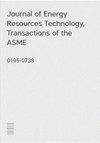Parametric analysis and design of a power plant to recover low-grade heat from data center electronics by using liquid nitrogen
IF 2.4
3区 工程技术
Q3 ENERGY & FUELS
Journal of Energy Resources Technology-transactions of The Asme
Pub Date : 2023-04-20
DOI:10.1115/1.4062378
引用次数: 0
Abstract
The purpose of this paper is to expound the recovery of low-grade heat deriving from cooling data center electronics, in order to sustain a thermodynamic cycle of the Rankine type, using cryogenic nitrogen as the working fluid. A novel conception of energy plant is proposed and considered where these resources are available. The evaporator, built in a closed and thermally insulated vessel, is the key component. Liquid nitrogen is evaporated by means of an immersed serpentine which provides for the thermal power and produces the pressurized gas. A supplementary reservoir acts as super-heater, as well as buffer. The plant is completed with a turboexpander that generates power and a pump to recirculate the fluid. A thermodynamic model is developed. A dimensioning procedure for all the subsystems is reported, while a verification analysis is made to detect the maximum pressure that can be exerted. Hence, an in-depth parametric analysis is made for two plant layout scenarios, based on the presence (1) and absence (2) of the supplementary tank. The simulations are aimed at determining all the operating parameters of the plant, as well as the performance. The results show that pressure is beneficial for performance, presenting scenario 1 as better than 2. The maximum nitrogen pressurization is 12-bar, which corresponds to an electric efficiency of 31.5 %, under a thermal supply of 2.79 kW per 1 kW of net electric power produced.利用液氮从数据中心电子设备中回收低品位热量的发电厂的参数分析和设计
本文的目的是阐述从冷却数据中心电子设备中获得的低品位热量的回收,以维持兰金型热力学循环,使用低温氮气作为工作流体。在这些资源可用的情况下,提出并考虑了能源工厂的新概念。蒸发器内置在一个封闭的隔热容器中,是关键部件。液氮通过浸没的蛇形管蒸发,该蛇形管提供热能并产生加压气体。一个补充储液器起到过热器和缓冲器的作用。该工厂配有一台产生动力的涡轮膨胀机和一台使流体再循环的泵。建立了热力学模型。报告了所有子系统的尺寸确定程序,同时进行了验证分析,以检测可施加的最大压力。因此,基于补充罐的存在(1)和不存在(2),对两种工厂布局方案进行了深入的参数分析。模拟的目的是确定工厂的所有操作参数以及性能。结果表明,压力对性能有利,情景1比情景2好。在每产生1kW净电力2.79kW的热供应下,最大氮气加压为12巴,相当于31.5%的电效率。
本文章由计算机程序翻译,如有差异,请以英文原文为准。
求助全文
约1分钟内获得全文
求助全文
来源期刊
CiteScore
6.40
自引率
30.00%
发文量
213
审稿时长
4.5 months
期刊介绍:
Specific areas of importance including, but not limited to: Fundamentals of thermodynamics such as energy, entropy and exergy, laws of thermodynamics; Thermoeconomics; Alternative and renewable energy sources; Internal combustion engines; (Geo) thermal energy storage and conversion systems; Fundamental combustion of fuels; Energy resource recovery from biomass and solid wastes; Carbon capture; Land and offshore wells drilling; Production and reservoir engineering;, Economics of energy resource exploitation

 求助内容:
求助内容: 应助结果提醒方式:
应助结果提醒方式:


